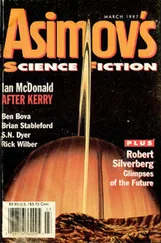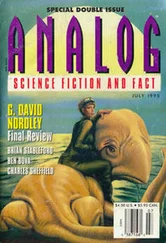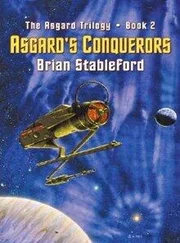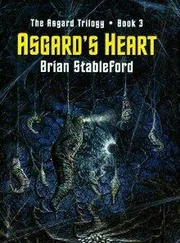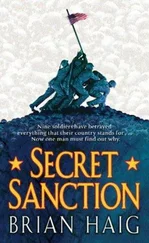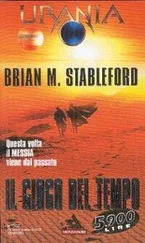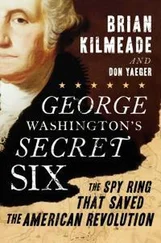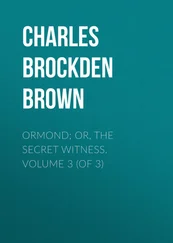The problems of delivering biological weapons don’t stop with finding carriers, of course. As soon as a tailored plague manifests itself, defences can be mobilised against it. Cases can be quarantined; vaccines can be sought. Those plagues spread furthest that have the longest incubation period—but incubation periods sufficient to allow an agent to be carried undetected to every corner of a Gaia-clone world, let alone a fledgling interstellar empire, require the users of the weaponry to take a very long view indeed.
Even humans had worked out, while fighting their own petty plague wars, that the most effective biological weapons—in the long term—were those which debilitated without killing, so that every sufferer would be a burden as well as an infective agent. They’d figured out, too, that it mustn’t show itself too soon, and mustn’t be too easily identifiable as an enemy agent when it did. The basic theory required a two-step process: infect first, trigger later.
The Salamandrans knew all that too. They had built an infective agent into Myrlin and his kin, but it was a subtle one; it wouldn’t run riot for a long time, and when it did, it would cause a long, slow social meltdown rather than a modern Black Death.
It was a good plan, in its way, but it had one all-important proviso attached to it. It was a good plan, so long as nobody knew about it. Once someone did, it could be short-circuited. The defenders didn’t even have to devise a defence against the primary agent, if that proved too difficult; they only had to devise a defence against the trigger.
As things turned out, the Salamandran homeworld fell too soon, too abruptly, and far too messily. They lost, or sacrificed, most of their prototype androids, but they didn’t manage to obliterate every last trace of the program. They provided Myrlin with a believable cover-story—representing him, of course, as a prisoner of war—but it wasn’t quite good enough. It passed the first inspection, but it fell apart on closer examination.
When Myrlin was initially picked up, he was treated as a liberated captive, in spite of his unusual size, but he never got off the surface of Salamandra—not, at least, until he had to make his escape, because he’d been spotted for what he was.
Nobody knew the details of the plan, but the invaders had eventually figured out that there had been a plan, and that he was part of it. Nobody knew exactly what it was that he was carrying, or how it was ultimately to be triggered, or when—but nobody was overly interested in niceties like that. They just wanted him dead. After all, from the Star Force viewpoint, he was only an alien android: a bioweapon.
From his own point of view, of course, things seemed very different. He had been grown in a tank and his developing brain had been fed by unorthodox methods, discreetly filled with synthetic memories and stocks of knowledge, but he thought of himself as fully and authentically human. He didn’t want to be a weapon of war. He didn’t intend to be a weapon of war. His only ambition was to be disarmed, if any disarmament were necessary.
He didn’t think it was. He didn’t think that the first phase of the operation had been completed, let alone the second stage of the programme. He thought that he had never even been primed to be infectious, and that even if he had, he was a weapon without a trigger, a bomb without a detonator—but it was in his interests not merely to think all those things but to believe them with all the passion and certainty of which a synthetic human mind was able.
Even if he had been primed, he explained, he wasn’t a problem that needed to be solved the Star Force Way. He could be disarmed. He could be quarantined. In fact, he had only escaped from custody in order to get himself disarmed, and quarantined. He had come to Asgard because the Tetrax were the cleverest biotechnicians in the humanoid community—and because there were so few humans here.
“You were never in any danger, Mr. Rousseau,” he assured me. “Even if you’d taken me in, you’d have been in no danger. Saul Lyndrach was in no danger from me— although he was, alas, from others.”
Well, I thought, when he told me that, you would say that, wouldn’t you?
What I said aloud was: “It’s personal, isn’t it? You and the star-captain. She was the one who liberated you. She was the one who mistook you for a Salamandran prisoner of war. It was a natural mistake, but she thinks she screwed up. She’s trying to make amends—to finish the mopping up. She thinks you might have infected her—her and all her men.”
“No!” he said. “They never took off their battle-suits. They didn’t dare. No one who came down to the surface of Salamandra and into the bunkers was licensed to breathe the air or touch the surfaces. I haven’t infected anyone. But you’re right—it is personal, for her. She was the one who liberated me.”
“Saul wasn’t wearing a battle-suit,” I pointed out. “Saul, whose dead body you left in my bed. I wasn’t wearing a battle-suit when I found him. Nor was Susarma Lear.”
“I haven’t infected anyone,” he insisted. “I hadn’t been primed. Even if I had, the infection would be harmless. There isn’t a trigger. Even if there was, it wouldn’t be timed to go off for a long time. I’m not dangerous , Mr. Rousseau.”
I didn’t doubt that he believed it, or that his belief was absolutely unshakable. But that didn’t mean that it was true. On the other hand, it did make sense. Even the worst situation imaginable wasn’t that bad. There was plenty of time to take precautions, if any turned out to be necessary. There was no reason for the Star Force to be so intent on hunting him down and killing him—except that that was the Star Force Way, and that Star-Captain Susarma Lear had made a mistake she was extremely keen to repair.
“Some day,” I said, “I might want to go back to the home system. If the people there think I’ve been infected with some alien bioweapon…”
“You haven’t.”
“Even so, they’ll want to be certain that I haven’t. Okay, so I’m not a secret army of hundreds or thousands—I’m no real danger, in practical terms. Even so, they will want to be certain. They’ll want to be certain about all of us—Susarma Lear, Serne, Vasari… everyone who’s ever been on Asgard.”
“They can be. They will be. They know about the programme now. It’s just a matter of investigation and analysis. They can remove that last nagging doubt, if they’re prepared to try. Even without Tetron help, it’s just a matter of making an effort. They’d check you over anyway, coming in from a place like Skychain City… even if you hadn’t been down here.”
He was right, of course. They would. There really wasn’t any more danger from whatever he might be carrying than there might be from any alien bug I might have picked up purely by chance, playing cards with a Zabaran, or making an everyday journey on a road-strip. You’d have to be paranoid to think otherwise—as paranoid as Star-Captain Lear and her commanding officers.
“The surviving details of the programme are in that warship’s cargo,” Myrlin told me. “If our own scientists can’t work it out, the Tetrax surely can.”
Our own scientists. He believed that he was human. Was the belief enough to make him human? Some would think so, others wouldn’t. I had to decide which side I was on.
“It can’t have been easy to hijack a starship, and escaping from what was left of the Salamandran surface,” I observed, thoughtfully.
“No, it wasn’t,” he admitted.
“You must be an exceptional human being.”
Читать дальше

